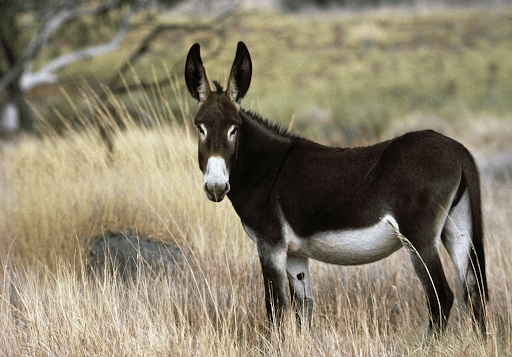In northwestern Australia, far from roads or major cities, a herd of wild donkeys carries a valuable promise. This remote region is the Kimberley, home to Kachana Station, a family-owned holistically managed landscape. The Henggelers have overseen Kachana Station for decades, and their management techniques have brought benefits for the soil, wildlife, and local climate.
The Kimberley is notorious for bushfires. These scorching, widespread fires are now year-round threats—a scenario that’s becoming more common across Australia. Frequent fires make it hard for land to recover, leaving hardened, impenetrable dirt that repels moisture. Plants, animals, and the ground itself grow thirstier by the day, and wildlife struggles to survive. Yet, in what seems like a desolate, barren land, a curious, long-eared, often-misunderstood animal brings an unexpected source of hope.
Wild donkeys are transforming the landscape one hoof and nibble at a time. During searches for water, donkeys dig wells, surpassing the impenetrable dirt barrier and mixing nutrients underground. This process rehydrates the land, providing moisture for other species including beloved marsupials like the quoll, bilby, and rock wallaby; in the Kimberley, revitalization of soil creates a welcome oasis in an otherwise parched environment. The rehabilitation of soil means rainfall can become absorbed once again. With rain feeding the local area, fire frequency and intensity diminish, the temperature decreases, and life returns.
Once rain gets stored underground, the water in the soil goes through evapotranspiration, a process consisting of plants drawing water from the soil and releasing it into the atmosphere through vapor. The more water accessible for plant roots, the more water released into the air and absorbed by clouds. When wild donkeys dig and cycle nutrients, they are partaking in this process, therefore helping the ecosystem maintain the local water cycle. Donkeys also graze on vegetation that would otherwise dry out and become fire fuel. Reducing fuel loads and helping create moisture are the two main ways wild donkeys assist with land and fire management. As demonstrated by Kachana Station’s donkeys, biodiversity is the foundation for the revival of Earth’s ecosystems.
Respecting natural processes allows nature to heal herself, as she’s been doing for millennia. When nature heals, we heal. As more people suffer the effects of heat waves and water shortages, Kachana Station’s work demonstrates the promise of ecological restoration. What is scarce today can one day be abundant. What is lacking today can one day be overflowing. The determining factor is us: humans and the collective decisions we make.
Climate change and biodiversity loss are in large part consequences of our land management methods, but the trajectory we’re on doesn’t have to be our destiny. Soil, plants, and animals will return when given an opportunity. It’s our job to grant that chance by allocating natural resources to their rightful places. When we foster interactions between wildlife and Earth’s elements, we promote nature’s self-sustainability.
Learn more about the interactions between humans, animals, and plants:
To support Kachana Station’s research on the role non-native wild donkeys have in the Kimberley, Bio4Climate created a campaign to raise public awareness. We developed a petition, interviewed wildlife conservationist Dr. Arian Wallach, and interviewed Chris Henggeler to share the story of Kachana Station. Despite the evidence of the many benefits donkeys provide to other species and the local ecosystem, the Western Australian government is demanding that the Henggeler family kill the donkeys in their care or risk facing major fines. If this kill order goes into effect, Kachana Station’s restoration efforts will be set back, with lost opportunities for key insights on herbivores and fire management. Join our campaign by signing our petition and sharing this blog with your friends and family. Every signature counts. As Chris says, we’re all in this together.
Thanks to supporters like you, we at Bio4Climate have made a difference in Australia, and the people on the ground in Australia, including Dr. Arian Wallach and Chris, Bob, and Jacqueline Henggeler, have made a difference in the United States. Despite the distance between these two countries, we all have plenty in common. We are all facing urgent, life-threatening global challenges. More importantly, we all have the ability to take action. No matter where we live or where we come from, everyone can contribute to our planet’s restoration, and that is the ultimate source of hope.
To learn more about the land restoration work being done at Kachana Station, watch their video on “How to Heal Country.”
Written by Tania Roa


I volunteer with donkeys in the western USA.
I have references. Available for month long work schedules- field work. Willing to contribute to donkey and land restoration!
I would love to come and help in any way.
I volunteer with donkeys in the western USA.
I have references. Available for month long work schedules- field work. Willing to contribute to donkey and land restoration!
I would love to come and help in any way.
Why cant Common Sense and proven results be taken into the decision making process by many Government Departments. What has been the response’s from the OWNERS OF ADJOINING PROPERTIES?
Where is the evidence of Landcare destruction by feral donkeys in parts of Australia.?
I am aware of aware of debates surrounding the culling of Brumbies in Alpine Regions.